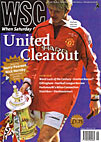 A fractured league system in Bosnian football continues to hamper the national team, as Mirsad Cviko explains
A fractured league system in Bosnian football continues to hamper the national team, as Mirsad Cviko explains
Season 1998-99 could be the turning point for football in Bosnia and Herzegovina. Incredibly, after a disastrous run of results last year, the national team still has a chance of qualifying for Euro 2000 and there now seems to be a possibility that pressure from UEFA will bring about a unified national league.
The two matches against Scotland this autumn will determine whether Bosnia take second place in their group. That they still have any chance at all is thanks to the departure of coach Dzemaludin Musovic, whose strange tactical ideas – often fielding teams with five or six attackers and only one midfielder – produced a string of bad results including a home draw with Estonia, a narrow win over the Faroes and a 4-2 defeat in Lithuania.
Musovic appeared to have little interest in finding out about opposing teams before playing them. Indeed, he seemed only to bother reading the football press when he knew that they were saying something about him, much of which was unflattering. A friendly defeat in Malta was the final straw and he was dumped in favour of Faruk Hadzibegic, a member of Yugoslavia’s 1990 World Cup team who had been coaching in France. He is doing the job unpaid having not yet signed a contract with the federation. Hadzibegic has a reputation as a disciplinarian – mobile phones are now banned in the training camp – and appears to command more respect among the players than his predecessor.
The team won the first competitive match under the new regime, 2-0 against Lithuania, before a depleted squad missing five regulars drew with the Faroes to set up the showdown with the Scots. They have to win in Sarajevo in September and will need at least a point in Glasgow the following month, but Hadzibegic is confident. “Our away record is not good but I played in a team that drew in Glasgow. I know they are strong fighters, but aggression is not enough. We have top-quality players who play throughout Europe and they have enough experience to win.”
Although the Bosnian team is widely described as “Muslim” this is not strictly true. The team contains Serbs – the best known being Sergej Barbarez of Borussia Dortmund – and Croats playing for clubs in Italy and Spain as well as Croatia itself. The coach’s biggest problem is with the home-based players, who are not good enough for international football and are unlikely to improve while the domestic league is in such poor shape.
Many stadiums were all but destroyed during the war and most clubs are desperately short of money – some players are on contracts worth only around £3,500 per year. Last year’s champions, Zeljeznicar of Sarajevo, are the most popular club, usually watched by around 7,000 fans, most of them teenagers. Local derbies with FK Sarajevo draw capacity crowds of nearly 40,000 in the national stadium.
Currently the league is divided into three “ethnic” parts. The top five clubs from the Bosnian Federation and the first three in the Croatian are supposed to play off for the league title and to decide European qualifying places. This year, however, the play-offs did not take place because of a political argument centred on the town of Mostar, which is separated into Muslim and Croat sectors.
UEFA decreed that Velez, the team in the Muslim area (UEFA Cup conquerors of Derby in 1974), should stage their home matches in their old stadium, Bijeli Brijeg. However, the ground is now under Croat control (having been used as a concentration camp during the fighting) and Velez were refused permission to play there by the Croatian authorities. All the Muslim clubs withdrew from the play-offs in protest. As a result UEFA barred Bosnian clubs from participating in Europe until a unified league was set up. The clubs in the Serb sector have already refused to participate in any such competition, and it is very hard to believe, after all this year’s problems, that the various parties will be able to strike a deal.
UEFA, with their special talent for international diplomacy, have agreed to allow Yugoslav clubs into this year’s UEFA Cup and Champions League (with the exception of Obilic, which is controlled by the indicted war criminal Zeljko Raznatovic) even though they were unable to finish last season’s league programme thanks to the Kosovo war. To punish the Bosnian clubs for the intransigence of the Croatian authorities in Mostar seems perverse by comparison. Nor will it do anything to raise the standards of the national team, already burdened with more problems than most.
From WSC 150 August 1999. What was happening this month